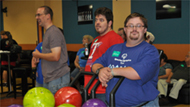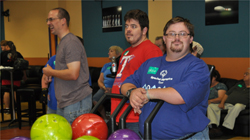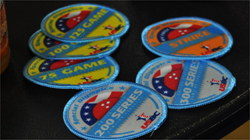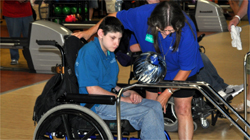Special Olympics, IBC celebrate EKS Day
September 22, 2012

 ARLINGTON, Texas - The United States Bowling Congress and the Special Olympics have a relationship that spans more than two decades, and the two came together again Saturday to help celebrate Eunice Kennedy Shriver Day.
ARLINGTON, Texas - The United States Bowling Congress and the Special Olympics have a relationship that spans more than two decades, and the two came together again Saturday to help celebrate Eunice Kennedy Shriver Day.More than 30 Special Olympians, their families, friends and supporters spent the afternoon at the International Training and Research Center, where they got to meet USBC Hall of Famer Kim Terrell-Kearney and bowl on the home lanes of Team USA, the defending men's and women's world champions.
With a bowling competition scheduled for Nov. 1-3 at nearby Cityview Lanes in Fort Worth, Texas, this visit to the ITRC also gave the athletes a chance to sharpen their skills and get tips from the same coaches who train some of the world's best bowlers.

"The USBC provided this great opportunity for our athletes and their families, not only to celebrate their enjoyment of bowling, but also to celebrate the life and contributions of Eunice Kennedy Shriver, the founder of the Special Olympics," said Sherron Peace, a program associate for the Special Olympics. "One of the best things about events like this is getting to see the excitement of the athletes, and today was a lot of fun for everyone."
The event was one of hundreds being held worldwide in honor of the late Shriver, whose vision was a platform where athletes with intellectual disabilities and special needs could compete and thrive in sports and other activities. Her efforts and spirit have inspired people across the globe to commit themselves in the areas of community, sport, health and education.
By bringing together people with and without disabilities, there is a message of unification and inclusion, and the playing field often can make people forget about their differences.
Each year since 1991, the Special Olympics National Unified Bowling Tournament and the USBC Open Championships have come together to give Special Olympics athletes the chance to compete on bowling's biggest stage as a lead-in to the Open Championships, which attracts more than 60,000 bowlers annually. Hundreds of Special Olympics bowlers from more than a dozen states converge on the championship lanes, often specially-constructed in a convention-center setting.
For two days, the venue belongs to the athletes and their supporters, who compete in team and doubles. While they may not actually be competing in the Open Championships, they still get to enjoy the championship atmosphere, including a trip through the scale room and a ceremonial march down Center Aisle.
In 2012, nearly 350 bowlers from 15 states traveled to Baton Rouge, La., for the National Unified Tournament. There were 46 divisions, so no bowler went home without an award. Each team included two Special Olympians and their unified partners, which helps carry the message of friendship and camaraderie from year to year.
In 2013, the tournament will be held at the one-of-a-kind National Bowling Stadium in Reno, Nev., where the Open Championships will run for 122 consecutive days from March 1-June 30.
 "Our USBC volunteers have a history of supporting the Special Olympics, and our relationship is only getting stronger nationally," said Eric Kearney, USBC Managing Director of Operations and Administration. "We enjoyed the opportunity to welcome the athletes and their families to the International Bowling Campus, and we were even more proud to be able to help recognize the visions and efforts of Eunice Kennedy Shriver."
"Our USBC volunteers have a history of supporting the Special Olympics, and our relationship is only getting stronger nationally," said Eric Kearney, USBC Managing Director of Operations and Administration. "We enjoyed the opportunity to welcome the athletes and their families to the International Bowling Campus, and we were even more proud to be able to help recognize the visions and efforts of Eunice Kennedy Shriver."About Special Olympics
Special Olympics is an international organization that changes lives through the power of sport by encouraging and empowering people with intellectual disabilities, promoting acceptance for all, and fostering communities of understanding and respect worldwide. Founded in 1968 by Eunice Kennedy Shriver, the Special Olympics movement has grown from a few hundred athletes to more than 3.7 million athletes in over 170 countries in all regions of the world, providing year-round sports training, athletic competition and other related programs. Special Olympics provides people with intellectual disabilities continuing opportunities to realize their potential, develop physical fitness, demonstrate courage, and experience joy and friendship.
For more information about the Special Olympics, visit www.specialolympics.org.








